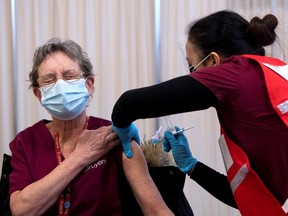
Ottawa
(Reported Friday, last update Tuesday)
Sign up to receive daily headline news from Ottawa Citizen, a division of Postmedia Network Inc.
Thanks for signing up!
A welcome email is on its way. If you don't see it, please check your junk folder.
The next issue of Ottawa Citizen Headline News will soon be in your inbox.
3: New deaths
900: Total deaths
20: Ottawa residents in hospital due to active infections
3: In ICU because of active infections
101: Confirmed COVID-19 patients in Ottawa hospitals as of Wednesday (including non-Ottawa residents), 32 in hospital because COVID-19 (3 in ICU) and 69 for other reasons (0 in ICU)
319: New COVID-19 cases (case numbers are considered underestimates with testing limited to certain groups)
83,137: Total cases
54: Ongoing outbreaks in institutional settings
17.3: Per cent test positivity in the community (seven-day average as of Wednesday)
The current public health situation
Health Canada has approved the use of the Pfizer-BioNTech COVID-19 booster vaccine that targets the BA.4 and BA.5 strains of the Omicron variant.
The vaccine, which is approved for people at least 12 years old, can be given three to six months after a second dose of the primary vaccine series, or the most recent booster shot.
Health Canada said the bivalent booster has already been given to nearly five million people in the United States and there have been no new safety concerns.
It is the second combination vaccine greenlit by Health Canada’s vaccine review team, but the first that targets the virus strains that are now most common in Canada.
“Canada will have enough supply of the Omicron-targeting bivalent vaccines to cover the anticipated demand for fall boosters,” Dr. Howard Njoo, Canada’s deputy chief public health officer, said on Thursday.
Ahead of a third Thanksgiving that will be celebrated during the pandemic, Ottawa Public Health suggested people planning gatherings consider heading outdoors or opening windows indoors to improve the ventilation.
Levels of COVID-19 in Ottawa remain high, according to OPH’s weekly update issued on Thursday. The health unit said last week that the city is in another wave of COVID-19.
The level of virus detected in wastewater remained high and relatively unchanged from a week earlier. The percentage of COVID-19 tests that come back positive remained high and was increasing. Hospital admissions and new outbreaks in hospitals, long-term care homes and other institutions were moderate and relatively unchanged
How to get vaccinated
Book vaccination appointments through Ontario’s COVID-19 vaccination portal or by calling the Provincial Vaccine Contact Centre at 1-833-943-3900 or through participating pharmacies.
OPH encourages people to make appointments because drop-in availability will be limited at community clinics.
How to get tested and treated for COVID-19
Antiviral treatments are available for people with symptoms — even if they’re mild — who are at higher risk of severe COVID-19, but they must be taken within the first five days of symptoms starting.
People can use the Ontario COVID-19 antiviral treatment screener to see if they’re at higher risk of severe illness and might benefit from the medication.
With lab testing in the province prioritized for people at increased risk and in high-risk settings. Ottawans can find out more about eligibility, how to book tests and seek treatment on the Ottawa Public Health website, along with self-isolation instructions.
Where to get rapid tests
Ontario is distributing free rapid antigen tests through participating pharmacy and grocery store locations.
With files from Jacquie Miller, The Canadian Press


